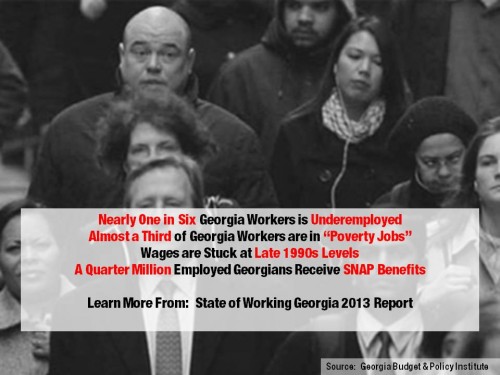 Most Georgia families still struggle to emerge from the long shadow of the Great Recession. Unemployment remains high, wages are flat, breadwinners work part-time when they want full-time jobs, public supports are still threatened and the economy isn’t adding jobs fast enough to recover from the downturn anytime soon.
Most Georgia families still struggle to emerge from the long shadow of the Great Recession. Unemployment remains high, wages are flat, breadwinners work part-time when they want full-time jobs, public supports are still threatened and the economy isn’t adding jobs fast enough to recover from the downturn anytime soon.
Those are among the findings of State of Working Georgia 2013, the Georgia Budget and Policy Institute’s annual spotlight on the vitality of Georgia’s workforce. Released each fall, the report provides lawmakers, advocates, journalists and interested citizens with a clear and vivid picture of ways the economy affects typical Georgia families.
This year’s edition is designed to help you explore areas of focus in the way you prefer. You can read the full analysis in one sitting, or select individual sections. Either way, the report provides a window into the struggles of Georgia families. It includes a wealth of data to document labor market trends, wages, educational attainment, health care coverage and other economic measures.
State of Working Georgia 2013 shows that while the state’s economy is slowly gaining some momentum, it is not growing quickly enough to meet Georgia workers’ needs. Families face a variety of economic challenges, and most Georgians will need years to fully recoup their losses from the downturn. Longer term, many Georgians face an uphill struggle to achieve a more secure, middle-class life.
Reversing these negative trends and improving the lives of Georgia’s middle- and low-income workers should be among the state’s top priorities. The only way to achieve a modern, more well-balanced economy is to make sure opportunities for advancement are available to all and family prosperity is broadly shared. Workers who are well-educated, well-paid, healthy and secure make better customers, better employees, better parents and better taxpayers.
Achieving that goal requires strong public support, because businesses and workers can’t thrive without a strong foundation for growth. An economy that works for everyone requires forward-looking investments in quality schools and well-maintained roads, as well as adequate support for families climbing the economic ladder. To stay on the path to success, Georgians need affordable health coverage, safe communities and temporary assistance for workers who lose their jobs.
Whether Georgians are born rich, poor, black, white, male or female, they each deserve the opportunity to achieve a better life through hard work. As Georgia moves deeper into the 21st century, state lawmakers should make the choices necessary to help working Georgians reach their full potential.









